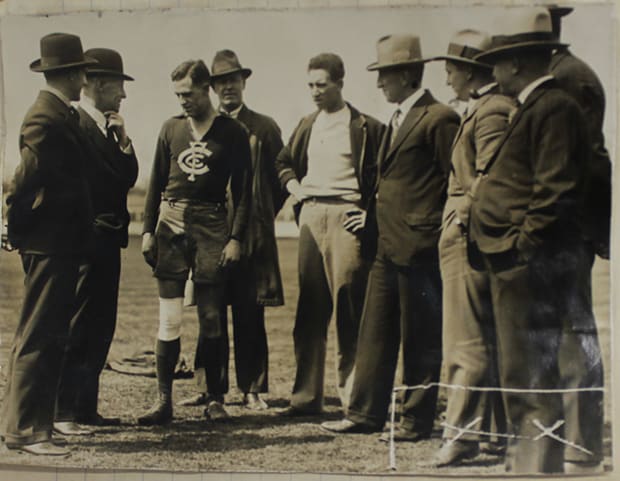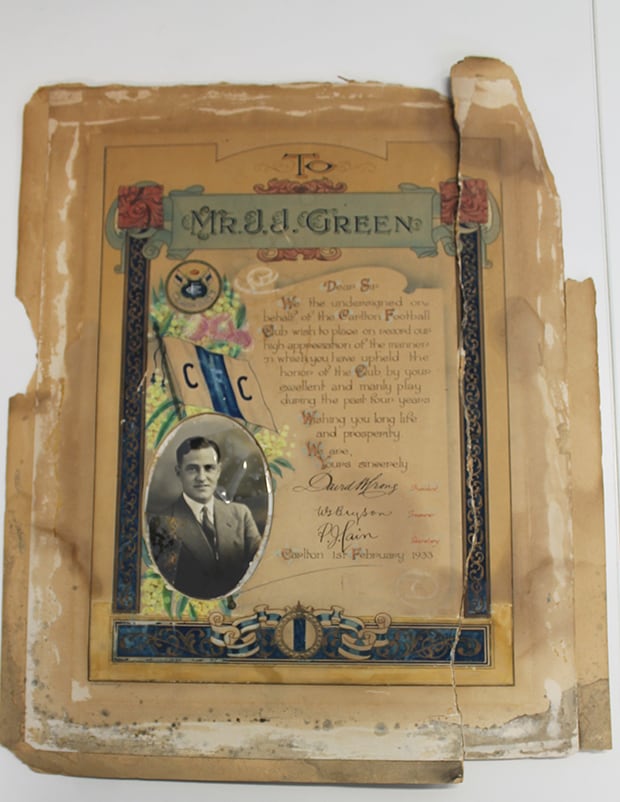The daughter of the former Carlton footballer Jack Green has seen fit to perpetuate her father’s memory by availing precious items of memorabilia for the club’s archive.
Amongst the artefacts are a hand-painted certificate of appreciation from 1933, along with sundry images and press clippings of Green, whose younger brothers Tom, Bob and Frank also represented the club as players.
Genevra Green, now domiciled in Thurgoona, an outer suburb of the regional city of Albury in southern New South Wales, forwarded the precious keepsakes.
She’d been encouraged to do so on the strength of an article which recently appeared on the Carlton website in tribute to Ray Brew, and old contemporary of Jack’s at Princes Park and best man at Jack’s wedding.
“Dad passed away in 1960 at the young age of 54 and it would be lovely if his story could be told too, with all its tragedy, triumph and courage,” Genevra said.
Born in Brunswick on Grand Final eve 1905, Jack was the oldest of five brothers – preceding Tom, Bob (himself a 187-game Carlton player), Frank (who died recently at the age of 97) and Bernie.
Genevra’s tale of her father’s early life corroborates that told by Bob’s son Terry in a previous interview, that the boys’ father, a well-known Bendigo hairdresser, returned from the Great War a changed man - which in turn posed enormous pressures on his relationship with their mother and inevitably led to irreconcilable differences.
In the wake of the parents’ separation, the mother was left to fend for the family, but when she suffered a breakdown Bob, Frank and Tom were placed into orphanages, with Jack and Bernie taken in by family friends.
“Dad was fostered by (former Carlton coach) Danny Minogue with brothers Tom, Bob, Frank (also Blues players) and Bernie all going to orphanages,” Genevra said.
“My father was the eldest and a brilliant student who won scholarships and eventually went to Newman College and studied law with Ray. He also won many awards at University Blues for football, cricket and tennis, and went on to join the firm of Nicholas O’Donohue and Brew.
“Dad also was also selected as a Rhodes Scholar, but could not travel overseas, so had to decline.”
Jack’s football prowess at amateur level with the University team did not go unnoticed at neighbouring Carlton – particularly through the 1928 season when he booted 118 for the Blacks in a season in which only one game was lost.
Such was Jack’s form that a scribe for the Amateur Footballer noted that the University’s phenomenal success “has been due to the wonderful all-round ability and accuracy of their star forward Jack Green. Lithe-limbed, cool and calculating, with a powerful spring and sure pair of hands, he has been the pivot of innumerable successful varsity onslaughts”.
As was the case some 80 years later with Chris Judd, Jack pitched for Carlton after it had won a vigorous contest over Melbourne and others for his services – and in May ’29, after donning the No.14 in the old dark Navy Blue, he duly completed his senior debut against Hawthorn at Princes Park.
Having ably supported the mainstays Horrie Clover and “Soapy” Vallence in his maiden season up front, Jack carved out his niche as a key forward of renown. Cruelly, a knee injury sustained in the ’32 Prelim against Collingwood cost him a place in the Grand Final narrowly won by Richmond, in what was an anti-climax to a season in which he’d earned Victorian selection.

Jack Green meets with selectors before being ruled out of the 1932 Grand Final with a knee injury. (Photo: Carlton Football Club)
In season 1933, Jack and his younger brother Bob turned out in ten senior matches for the club, but when Geelong overpowered Minogue’s Blues in the cut-throat first-semi, Jack left the fray in his 85th and final appearance – and was subsequently released to Hawthorn in an apparent trade for Jim Francis.
Jack duly responded by kicking 80 goals for the Mayblooms on debut – the most goals kicked by anyone at Glenferrie in 34 years until Peter Hudson’s 125 in season ’68.
Jack’s 40 games over three seasons at Glenferrie landed him the impressive haul of 167 goals at the robust average of 4.17.
As Genevra said: “Whilst he may not have played as many games for the Blues as Ray (Brew), due to knee injury, which eventually saw him off-loaded to then cellar-dwellers, Hawthorn, he did play in a number of interstate games and was regarded as a top player . . . and if memory serves me correctly, he was the first players’ advocate at tribunal hearings”.
During this time, Jack and his brothers pursued their interests in music, as Terry remembered.
“Three of them later became members of the Hawthorn city band, for music must have been an outlet, and then there was the football. They were, to coin the phrase, a ‘band of brothers’,” Terry said.
“For them, football was the necessary distraction, a distraction that enabled them to sustain themselves. They had to have something that gave them the glue of life away from the orphanage and without parents to guide them. I can’t begin to imagine what that must have been like.”
Jack also furthered his professional career in radio. For years he called football matches for 3KZ in the lofty company of Norman Banks and Phil Gibbs.
Jack was truly a part of the fold at KZ, as an article and image appearing in an old edition of Listener In attests. He joined Banks in calling the 1947 Grand Final – a recording of which is now in the keep of the football club’s collection.
Jack’s son John can be heard in this recording, because the then nine year-old accompanied his father into the broadcast box on Grand Final day – Saturday, September 27, 1947.
“I was under strict orders to not make a sound whilst I watched the Carlton Essendon Grand Final,” John told this reporter in a previous interview.
“Carlton was five points down with less than a minute to the bell with the ball out of bounds near the Carlton goal. On the throw-in, Ken Baxter grabbed the ball and passed it to Freddy Stafford who, half turning, screwed a left foot kick over his shoulder and scored the winning goal.
“At that moment, I made my radio debut by shouting ‘HOORAY’ in the broadcasting box.”
But the last word for the story of Jack Green surely belongs to Genevra – and it’s a touching tale at that.

Jack Green's certificate of appreciation. (Photo: Carlton Football Club)
”Dad was with Norman Banks one hot summer’s night when there was an electricity strike (so no trams) and he and Norm decided to walk home from the city to our home in Queen’s Road so that Norm could get a lift to his home in our car,” she said.
“During their walk, on passing a unit opposite the Shrine, they saw a little old lady singing a Christmas Carol with a candle on her table and Norm commented how nice it was to hear Carols by Candlelight.
“That’s where it started, Norm followed up on his comment and so the tradition was born.”



